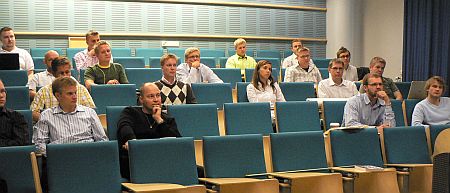In the first week of September, I was in Finland to launch the Master’s Degree in International Service Business Management at Helsinki Polytechnic Stadia. Here’s what the instructor’s view looks like.

The classes for this one-year program run on Thursday and Fridays, with all of the lectures front-loaded into the fall. Since I don’t live in Finland, I installed Drupal as a content management system, and have been communicating with the students at a distance.
I had originally set up rendez.org as a web site for our 2-year project on business innovation. As an (informed) experiment, I decided to implement Drupal as a content management system. (On the ISSS site, a prior pilot on phpWebSite wasn’t so successful. Open source software is “free”, but it may be a case of designing a first web site to learn, and then doing it for real on a second try.)
Drupal can be configured with different access rights via the Organic Groups module. I created the stadia-2006 group, and the students first communicated via the forums. On my visit to Finland in October, the students said that the forums were getting to be hard to follow, and requested a different way.
After 3 hours of thinking — and 10 minutes of implementation! — I had an creative approach. An interesting feature of Drupal is that every user can have a blog. I asked the students — in addition to handing in a hard copy to Taina for grading — to post a soft copy of their assignments to their blogs.
I don’t have authority to issue grades at Stadia, but the students are primarily interested in feedback on their work, as they build towards doing a master’s thesis. The deal is that I’ll provide comments on the blog entries (assignments), that everyone can read, in the open. This alleviates the backlog in my e-mail in-basket — a real work-reducer. If there’s something really confidential in the report, the student can e-mail me the assignment directly, but blogging gives a real opportunity for peer-to-peer learning.
It took 5 minutes for the students to get comfortable with the idea of posting their work in the open, but in this rapid-paced world of electronic communications, the blogs make sense. Some of the students already had experience with blogs, so I asked them to help out the peers that were novices.
Now, with 30 students in the class, I do have a large number of papers to review … although I can access them where ever I have an Internet connection.


